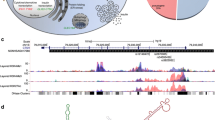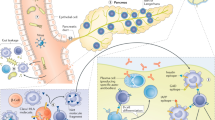Abstract
In contrast to primary beta cell failure mediated by autoimmunity in type 1 diabetes, type 2 diabetes is generally recognized as an imbalance between insulin sensitivity and beta cell function. Although most epidemiological studies have demonstrated the role of insulin resistance in the pathogenesis of type 2 diabetes, it is now well-accepted that failure of beta cells to compensate for prevailing insulin resistance is required for the development of overt diabetes. Since type 1 diabetes is an autoimmune disease, the term “diabetes genes” is generally applied to the genes involved in the pathogenesis of type 2 diabetes. This chapter will focus on the impact of human genome project on the genetic studies of diabetes with a brief discussion of the diabetes genes known to play a role in type 2 diabetes.
Access this chapter
Tax calculation will be finalised at checkout
Purchases are for personal use only
Preview
Unable to display preview. Download preview PDF.
Similar content being viewed by others
References
Tanizawa Y, Matsutani A, Chiu KC, Permutt MA. Human glucokinase gene: isolation, structural characterization, and identification of a microsatellite repeat polymorphism. Mol Endocrinol 6: 1070–1081, 1992.
Hattersley AT, Turner RC, Permutt MA, Patel P, Tanizawa Y, Chiu KC, O’Rahilly S, Watkins PJ, Wainscoat JS. Linkage of type 2 diabetes to the glucokinase gene. Lancet 339: 1307–1310, 1992.
Matschinsky F, Liang Y, Kesavan P, Wang L, Froguel P, Velho G, Cohen D, Permutt MA, Tanizawa Y, Jetton TL. Glucokinase as pancreatic beta cell glucose sensor and diabetes gene. J Clin Invest 92: 2092–2098, 1993.
Inoue H, Tanizawa Y, Wasson J, Behn P, Kalidas K, Bernal-Mizrachi E, Mueckler M, Marshall H, Donis-Keller H, Crock P, et al. A gene encoding a transmembrane protein is mutated in patients with diabetes mellitus and optic atrophy (Wolfram syndrome). Nat Genet 20: 143148, 1998.
Glaser B, Chiu KC, Anker R, Nestorowicz A, Landau H, Ben-Bassat H, Shlomai Z, Kaiser N, Thornton PS, Stanley CA. Familial hyperinsulinism maps to chromosome 11p14–15.1, 30 cM centromeric to the insulin gene. Nat Genet 7: 185–188, 1994.
Nestorowicz A, Glaser B, Wilson BA, Shyng SL, Nichols CG, Stanley CA, Thornton PS, Permutt MA. Genetic heterogeneity in familial hyperinsulinism. Hum Mol Genet 7: 1119–1128, 1998.
Risch NJ. Searching for genetic determinants in the new millennium. Nature 405: 847–856, 2000.
Reich DE, Cargill M, Bolk S, Ireland J, Sabeti PC, Richter DJ, Lavery T, Kouyoumjian R, Farhadian SF, Ward R, et al. Linkage disequilibrium in the human genome. Nature 411: 199–204, 2001.
Davies JL, Kawaguchi Y, Bennett ST, Copeman JB, Cordell HJ, Pritchard LE, Reed PW, Gough SC, Jenkins SC, Palmer SM. A genome-wide search for human type 1 diabetes susceptibility genes. Nature 371: 130–136, 1994.
Mein CA, Esposito L, Dunn MG, Johnson GC, Timms AE, Goy JV, Smith AN, Sebag-Montefiore L, Merriman ME, Wilson AJ, et al. A search for type 1 diabetes susceptibility genes in families from the United Kingdom. Nat Genet 19: 297–300, 1998.
Concannon P, Gogolin-Ewens KJ, Hinds DA, Wapelhorst B, Morrison VA, Stirling B, Mitra M, Farmer J, Williams SR, Cox NJ, et al. A second-generation screen of the human genome for susceptibility to insulin-dependent diabetes mellitus. Nat Genet 19: 292–296, 1998.
Neel JV. Diabetes mellitus: a “thrifty” genotype rendered detrimental by “progress”? Am J Hum Genet 14: 353–362, 1962.
Hales CN, Barker DJ: Type 2 (non-insulin-dependent) diabetes mellitus: the thrifty phenotype hypothesis. Diabetologia 35: 595–601, 1992.
Hanis CL, Boerwinkle E, Chakraborty R, Ellsworth DL, Concannon P, Stirling B, Morrison VA, Wapelhorst B, Spielman RS, Gogolin-Ewens KJ, et al. A genome-wide search for human non-insulin-dependent (type 2) diabetes genes reveals a major susceptibility locus on chromosome 2. Nat Genet 13: 161–166, 1996.
Cox NJ, Frigge M, Nicolae DL, Concannon P, Hanis CL, Bell GI, Kong A. Loci on chromosomes 2 NIDDM1 and 15 interact to increase susceptibility to diabetes in Mexican Americans. Nat Genet 21: 213215, 1999.
Horikawa Y, Oda N, Cox NJ, Li X, Orho-Melander M, Hara M, Hinokio Y, Lindner TH, Mashima H, Schwarz PE, et al. Genetic variation in the gene encoding calpain-10 is associated with type 2 diabetes mellitus. Nat Genet 26: 163–175, 2000.
Baier LJ, Permana PA, Yang X, Pratley RE, Hanson RL, Shen GQ, Mott D, Knowler WC, Cox NJ, Horikawa Y, et al. A calpain-10 gene polymorphism is associated with reduced muscle mRNA levels and insulin resistance. J Clin Invest 106: R69 - R73, 2000.
Prochazka M, Lillioja S, Tait JF, Knowler WC, Mott DM, Spraul M, Bennett PH, Bogardus C. Linkage of chromosomal markers on 4q with a putative gene determining maximal insulin action in Pima Indians. Diabetes 42: 514–519, 1993.
Mitchell BD, Kammerer CM, O’Connell P, Harrison CR, Manire M, Shipman P, Moyer MP, Stern MP, Frazier ML. Evidence for linkage of postchallenge insulin levels with intestinal fatty acid-binding protein (FABP2) in Mexican-Americans. Diabetes 44: 1046–1053, 1995.
Baier LJ, Sacchettini JC, Knowler WC, Eads J, Paolisso G, Tataranni PA, Mochizuki H, Bennett PH, Bogardus C, Prochazka M. An amino acid substitution in the human intestinal fatty acid binding protein is associated with increased fatty acid binding, increased fat oxidation, and insulin resistance. J Clin Invest 95: 1281–1287, 1995.
Chiu KC, Chuang LM, Chu A, Yoon C. Fatty acid binding protein 2 and insulin resistance. Eur J Clin Invest 31: 521–527, 2001.
Deeb SS, Fajas L, Nemoto M, Pihlajameaki J, Mykkeanen L, Kuusisto J, Laakso M, Fujimoto W, Auwerx J. A Prol2Ala substitution in PPARgamma2 associated with decreased receptor activity, lower body mass index and improved insulin sensitivity. Nat Genet 20: 284–287, 1998.
Altshuler D, Hirschhorn JN, Klannemark M, Lindgren CM, Vohl MC, Nemesh J, Lane CR, Schaffner SF, Bolk S, Brewer C, et al. The common PPAR gamma Prol2Ala polymorphism is associated with decreased risk of type 2 diabetes. Nat Genet 26: 76–80, 2000.
Chiu KC, Chuang LM, Ryu JM, Tsai GP, Saad MF. The I27L amino acid polymorphism of hepatic nuclear factor-lalpha is associated with insulin resistance. J Clin Endocrinol Metab 85: 2178–2183, 2000.
Editor information
Editors and Affiliations
Rights and permissions
Copyright information
© 2004 Springer Science+Business Media New York
About this chapter
Cite this chapter
Chiu, K.C., Martinez, D.S. (2004). Diabetes Genes. In: Poretsky, L. (eds) Principles of Diabetes Mellitus. Springer, Boston, MA. https://doi.org/10.1007/978-1-4757-6260-0_7
Download citation
DOI: https://doi.org/10.1007/978-1-4757-6260-0_7
Publisher Name: Springer, Boston, MA
Print ISBN: 978-1-4757-6262-4
Online ISBN: 978-1-4757-6260-0
eBook Packages: Springer Book Archive




